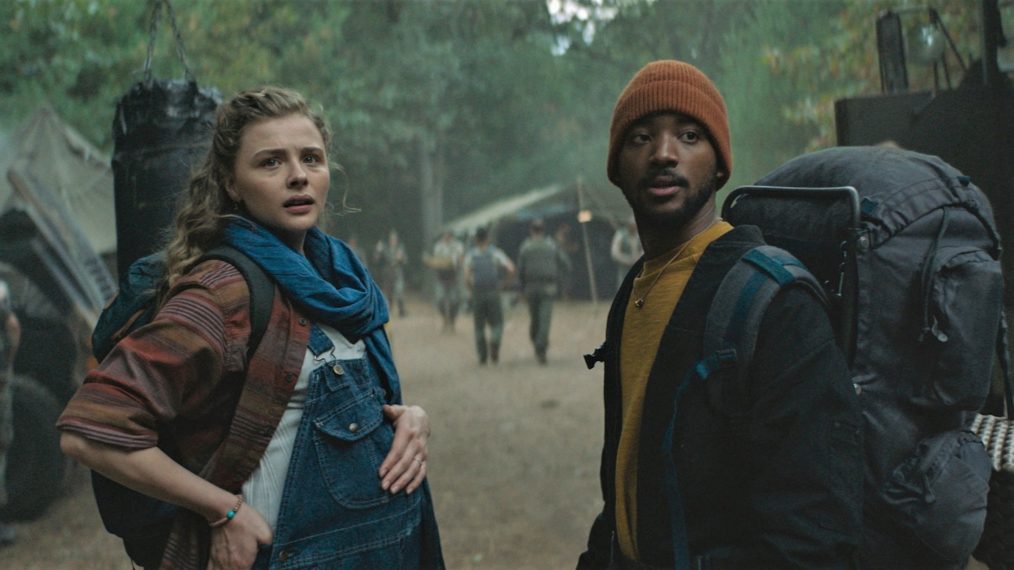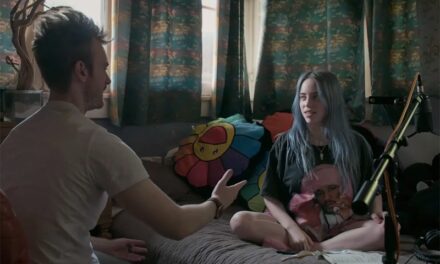A common Sci-Fi trope is the premise of humans thinking they can use artificial intelligence for some servitude purpose. Despite all warnings, we love us some convenience. The Terminator franchise and 2004’s I, Robot are examples of this principle going wrong and essentially doom humanity if programs or machines grow aware of their intelligence. Mother/Android fits in the same clothing, where androids are relegated to assistants and home helpers. But before the world bursts into a never-ending calamity, writer/director Mattson Tomlin presents two characters having a conversation in a bathroom on Christmas Eve. Georgia (Chloë Grace Moretz) has just found out she’s pregnant and her boyfriend, Sam (Algee Smith), is there to comfort her in the best way possible.
Naturally, there’s some trepidation on her part. She’s young and questioning if Sam is the person she wants to embark on this commitment. However, something off with the family android—it says “Happy Halloween” instead of Merry Christmas. At a party, a random glitch happens, and all of them erupt into a murderous rage. Then, quickly, the film jumps nine months into the future. Georgia can have the baby at any time, and the couple is doing all they can to survive before the baby is born.
More than the world’s calamities falling apart around them, the urgency is the impending bundle of joy. That’s where the heart of Mother/Android exists. Georgia and Sam have some quiet moments together, sleeping in a tent, trying to find shelter. It’s a damp, inhospitable world around them. Cinematographer Patrick Scola encompasses how lonely the wilderness and deserted houses can be. All they have is one another. Moretz and Smith play off one another regarding their limited future aspirations. Sam wants to prove he can provide both Georgia and their newborn. His enthusiasm often gets them into trouble in an atmosphere where too many wrong moves can be deadly. His heart is in the right place, and while Georgia still doubts his intentions, she has a sense of devotion to him. These dynamics work together once they are separate, and things become more dangerous. This is when Georgia reciprocates her love for Sam the most, other than small moments where they fantasize about a future that may not be.
The emotional fabric tries to hold everything together, but unfortunately, Mother/Android falters in other areas. Typically, it falls into many tried-and-true story beats like search and rescue missions. A moment happens when Georgia and Sam stay temporarily at an army base. Given the state of the world, the dourness has turned these soldiers as cold as the machines they are facing. While this is a contained story, that aspect could have been expanded. Special effects concerning the androids, especially when damaged, look off at points within the film. Android’s conflict seems so solvable on a particular side; it becomes hard to dredge up the suspense. Aside from this small family venturing to get to an alleged safe point in Korea.
Midway through the film, an interesting character named Arthur (Raúl Castillo) gets introduced. His presence is there to fill in the blanks with brief exposition on how things turned into an ongoing war. On the one hand, he fits the “lone survivor” archetype, but as things progress, you’ll find out there are more layers to peel back. Tomlin takes a dissimilar stab at characters living through a world rocked by a cataclysmic electronic event, focusing on one story. Mother/Android contains two impending parents with no blueprint on how to do so. Oh, and they have to stay alive in a world where human life may be few or unhelpful. The urgency is there, but it’s wrapped in so many things we have seen that it dilutes what is an intriguing preface.
Photo Credit: Hulu













